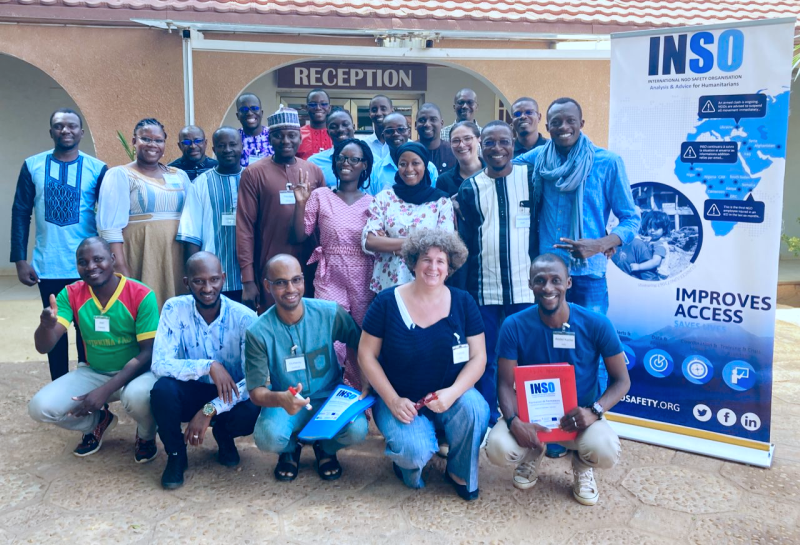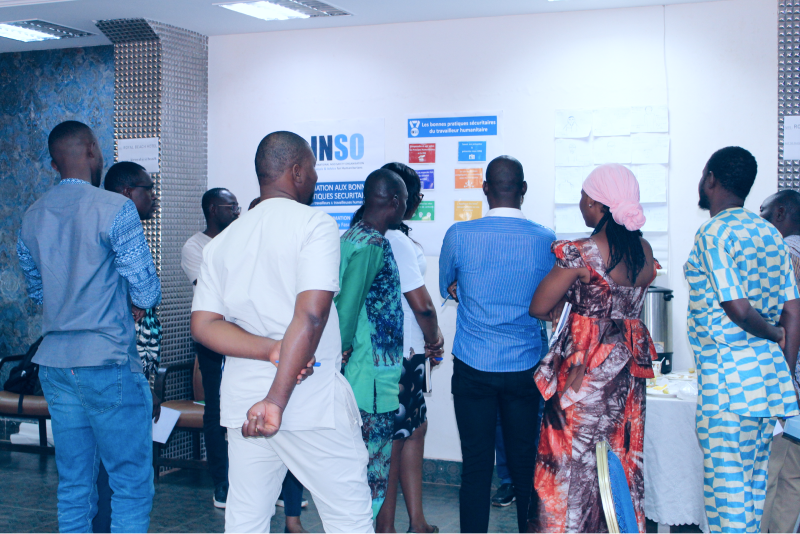The Induction to Safety and Security (ISS) Training of Trainers is an innovative programme initiated by INSO to address the strong demand for training from humanitarian workers operating in high-risk locations. In Burkina Faso and Niger, INSO teams have recently implemented this programme with their partners and are already seeing the results.
This programme has two components, the first of which is an INSO-hosted training that equips NGO staff with thematic knowledge and educational approaches to disseminate security trainings in their own organisations. These trainings are then followed by direct support from INSO teams to the trained NGO staff in implementing their own training plan.
The initial trainings took place in Niamey from 3 to 6 July, and in Ouagadougou from 10 to 12 July. The second component – trainings planned and led by the participants within their own organisations – is taking place all the way until 15 November. In total, 10 participants from Burkina Faso took part, representing seven international and three local NGOs. Aziz, a participant from a local NGO in Burkina Faso, says the training prepared them both from a technical and theoretical perspective.
“At first, I didn’t feel capable of delivering safety trainings. However, the methodology used by the trainers was appropriate and I was well prepared technically.”

The group of INSO training graduates, ready to deliver their own sessions.
Participants of this training programme were identified based criteria including the existing capacity of organisations to conduct internal training, number of staff, logistics, and each organisation’s willingness to engage. Participants were required to disseminate at least two sessions within their respective NGOs, but many trainees, like Aziz, have done far more.
“I organised nine sessions with at least 150 people across the five different areas where my NGO operates. I used the teaching aids and scenarios I received from INSO for my own sessions. However, after two or three of these, I was already autonomous and no longer needed to rely on the resources, which shows how well we have been trained.”
The modules covered within ISS include International Humanitarian Law, fundamental humanitarian concepts, and incident handling. Participants were also equipped with facilitation skills.
Gwladys, an HR Manager and the Security Officer for an international NGO, says the training equipped her well. Since the training, she has delivered eight sessions in six localities where her organisation is based.
“I was glad to have been selected for the training as it shows that INSO prioritises women’s participation in its training programmes,” says Gwladys.
“The content of the modules was very rich, and I really appreciated the way the trainers delivered the modules, with practical facilitation exercises that allowed us to strengthen our facilitation skills. I also enjoyed the friendly atmosphere among the participants.”
As for Charles, another participant from a local NGO, it was the thematic issues addressed in the modules and the participative approach that he most appreciated:
“The modules were relevant, especially for those of us working for national NGOs based in communities that have been negatively affected by the security situation. The participative approach was also practical. We ran simulations, and this significantly strengthened our capacities.”
Charles says he has delivered three of his five planned sessions, with the remaining two planned to occur before the programme concludes.
And Charles says the training he has provided is already having results. Charles encouraged his colleagues during his trainings to be engaged in security management, which ultimately improves the safety of all staff. Now, more and more staff from field teams reach out to him to share security information and get orientations and advice.
Overall, the impact of this Training of Trainers has been more significant than even the INSO team expected. Since the initial training, participants have delivered 50 sessions to 632 field workers – including 201 women – in 17 locations across Burkina Faso.
The success of the training course was made possible thanks to the combined efforts of the Niger and Burkina teams, as Gildas, Training Manager at INSO, reflects.
“Organising this multi-country session was a logistical coordination challenge that the training and operations colleagues in both countries met thanks to a collaborative effort and a great involvement.”
INSO in Burkina Faso is supported by the USAID’s Bureau of Humanitarian Assistance (BHA), the European Commission, Luxembourg’s Ministry of Foreign Affairs, the United Kingdom’s Foreign, Commonwealth & Development Office, The Swedish International Development Cooperation Agency (Sida) and the Swiss Agency for Development and Cooperation.

